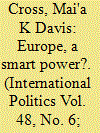| Srl | Item |
| 1 |
ID:
108379


|
|
|
|
|
| Publication |
2011.
|
| Summary/Abstract |
Smart power is defined as the effective combination of both hard and soft power. The concept is increasingly used in policy and academic debates, yet a clear understanding of what it actually means is still lacking. As a result, there is little serious consideration of how smart power can contribute to long-standing debates about power in international relations. This article seeks to clarify the meaning of smart power through first analyzing its main components - hard and soft power - separately; and second bringing these components together to re-conceptualize smart power. The aim is to make smart power more analytically useful, and to outline the various ways in which hard and soft power can be combined effectively. The author considers the case of Europe to argue that it is mainly a soft power and sometimes a smart power.
|
|
|
|
|
|
|
|
|
|
|
|
|
|
|
|
| 2 |
ID:
124619


|
|
|
|
|
| Publication |
2013.
|
| Summary/Abstract |
This article advances the argument that security integration is occurring in the European Union (EU) as a result of the influence of certain knowledge-based networks or epistemic communities. Given that EU member-states consistently resist integration in areas that are central to traditional state sovereignty, security integration presents a puzzle. The case of the EU Military Committee (EUMC) will serve as an example of how and why epistemic communities matter in security decision-making. Although the EUMC and the Common Security and Defence Policy are relatively new, the power of shared expertise among high-level military officers has already begun to dismantle sovereign barriers to security integration. In considering the puzzle of security integration, this article suggests that the epistemic community framework provides a better explanation for the emergence of a European security space than alternative arguments, such as principal-agent theory, intergovernmental bargaining, and regime theory. The case of a military epistemic community also serves to broaden the epistemic community literature, which tends to focus somewhat narrowly on cases of environmental and economics experts.
|
|
|
|
|
|
|
|
|
|
|
|
|
|
|
|